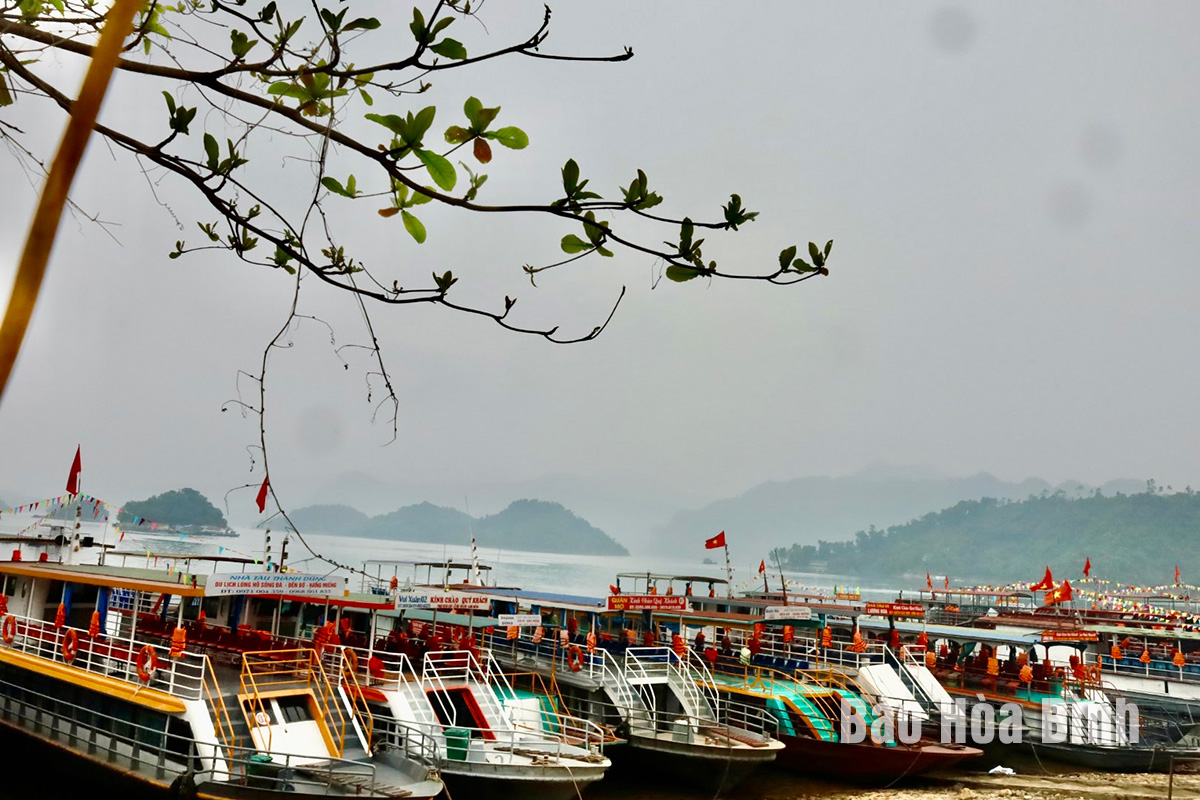
Besides community-based tourism, communes in the lake area of Cao Phong districts boasts huge potential to develop resort- and eco-tourism. Local spiritual tourism, particularly, has been appealing to visitors from far and wide.
Thung Nai port in Cao Phong
district.
According to Chairwoman of the Thung Nai commune
People’s Committee Bui Thi Luyen, Thung Nai port, with wharf and waiting lounge
upgraded and tourism services improved, is an important port to bring visitors
to the Hoa Binh Lake Tourist Area.
A 20-minute boat ride will take tourists to the
Thac Bo Temple, a renowned spiritual destination where they pray for good luck
and prosperity, and enjoy picturesque landscapes. Domestic and foreign tourists have flocked to Mo
hamlet in Binh Thanh commune, Cao Phong district, to experience tranquil
lifestyle and discover the architecture of the Muong ethnics’ traditional stilt
house.
Many tourists stop by the community-based
tourism sites in Mo hamlet, Binh Thanh commune, and Tien hamlet in Thung Nai
commune to explore local culture and feel the beat of the tranquil lifestyle
there. My Anh, a representative from a travel firm in
Hanoi, said her business has introduced and developed diversified tours to the
Hoa Binh Lake Tourist Area, with those to the Muong Ethnic Group Cultural Space
Museum in Hoa Binh city and the community-based tourism sites in Thung Nai and
Binh Thanh communes favoured by tourists. Well-preserved traditional stilt house, stunning
scenes and standout cultural experience have made the communes attractive to
visitors.
Notably, development of transport infrastructure
and wharves have helped Hoa Binh attract capital to build accommodations and
tourism offerings in the Hoa Binh Lake area. Many corporations have studied, surveyed and
landed high-quality resort and eco-tourism investment in the two communes.
Notably, the five-star Parahills resort, developed by Beru Group joint Stock
Company, has been recently put into operation in Binh Thanh commune. Together with other tourism projects being
carried out, the resort is expected to contribute to elevating local tourism
profile.
According to head of the Culture-Information
bureau of Cao Phong district Pham Ngoc Nhat, developing the resort- and
eco-tourism, spiritual tourism and community-based tourism is a bold step to
diversify offerings to attract visitors, thus helping improve sustainable local
livelihoods and create jobs for local workers and promote growth for the Hoa
Binh Tourist Lake Area.
With its pristine landscapes, unique cultural heritage of Muong ethnic minority, and an expanding range of visitor experiences, Tan Lac district of Hoa Binh has fast become a captivating destination for both domestic and international tourists.
Until now, Sung village in Cao Son commune, Da Bac district remains the only Dao ethnic community in Hoa Binh province to develop a community-based tourism model. Beyond its untouched natural landscapes, cultural identity serves as the cornerstone attraction for visitors.
Alongside the diverse cultural identities of the Kinh, Muong, Tay, Thai, Dao, and Mong ethnic people, Hoa Binh province is also renowned as the "capital" of the northwestern Vietnamese cuisine, offering unique and distinctive dishes. At festivals, during Lunar New Year (Tet), or on significant family or community occasions, special dishes are prepared, leaving a lasting impression on visitors.
A Phong Linh (Yellow Tabebuia) flower garden in Thang village, Thach Yen commune, Cao Phong district is currently in full bloom, drawing a large number of visitors.
Community-based tourism has been thriving in Pa Co commune, Mai Chau district thanks to advantages in natural landscape and cultural identity.
Doan Ket commune of Yen Thuy district has recently held a ceremony to receive a certificate recognising Ta communal house as a provincial-level historical and cultural relic site.



